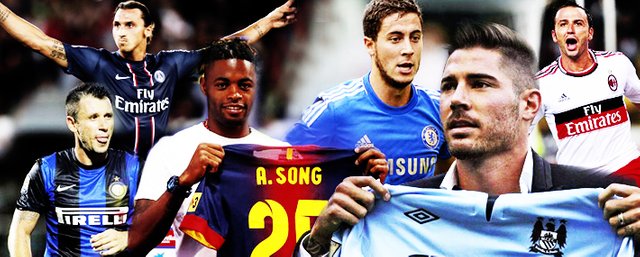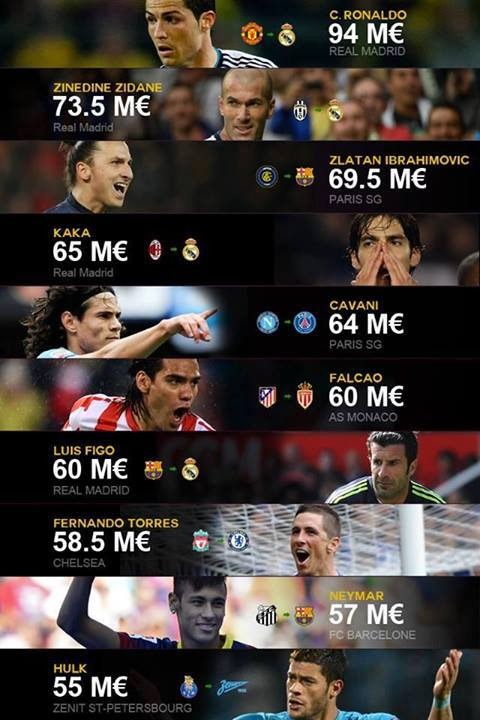Football Transfers - Expectations and standards

On Saturday, the European transfer market officially opens. Though many deals have
been sorted before that July 1 date, time will
now tick on towards Thursday, Aug. 31 when the window slams shut.
It has already been a market flush with
inflated prices. Liverpool paid £36 million
for Roma's Mohamed Salah; Manchester
United are expected to part with £40m for
Nemanja Matic, a player essentially surplus
to requirements at Chelsea; Kyle Walker's
move from Tottenham is Manchester City
mooted at a price of £50m.
When such fees are being splashed out,
instant results are expected from the recruit.
Conventional wisdom dictates that a player
will perform better when given a full
preseason with his new coaches and
teammates, but do the biggest deals of the
last 10 summer Premier League transfer
windows show that? Or does it not matter
when a superstar is signed?

2007: Fernando Torres -- Atletico Madrid to
Liverpool -- £26.5m, July 4.
Rafael Benitez made sure he got this deal
wrapped up nice and early and was rewarded
with a superlative first season from Torres, a
couple of niggling injuries notwithstanding.
Torres' 24 Premier League goals set a record
for an incoming foreign striker's first season.
During this season and the next, Liverpool
enjoyed Torres at his height.
2008: Robinho -- Real Madrid to Manchester
City -- £32.5m, Sept. 1.
Having been taken over that very morning by
Abu Dhabi billionaire Sheikh Mansour, City's
dash to try and sign players provided the
craziest day in Transfer Deadline Day history.
Having been beaten to the punch by
Manchester United for Dimitar Berbatov,
Robinho was snapped up from Real Madrid.
A last-minute impulse purchase proved itself
hasty as, beyond a few flourishes, the
Brazilian was wholly unsuited to English
football. By January 2010, Robinho was
loaned out to former club Santos and left for
a €15m move to Milan not long after.
2009: Carlos Tevez -- Manchester United to
Manchester City -- £25.5m July 14.
Technically, Tevez was a free agent, his
"loan" at United from MSI, the agency that
owned his economic rights, having expired
on July 1. The swiftly-done deal was
reported to be worth £25.5m before reports
then claimed it was actually up to £47m,
though that was disputed by club and agent
Kia Joorabchian. What City got for their
money was a player who irked Sir Alex
Ferguson upon arriving, bagged over 20
goals in his first two seasons and captained
City to winning the FA Cup in 2011.
2010: Yaya Toure -- Barcelona to
Manchester City -- £28m, July 2.
Another deal sorted at the start of the
window proved to be one of the best in City's
history. While Barcelona played him in
defence and defensive midfield, under
Roberto Mancini's management, Toure
swiftly became the heartbeat of a team that
ended a 35-year trophy drought. Enjoying his
attacking midfield role, Toure scored the
goals that beat United in the semifinal and
Stoke in that 2011 final.
2011: Sergio Aguero -- Atletico Madrid to
Manchester City -- £38m, July 28.
Aguero was signed as City completed their
preseason duties, and it was obvious as
soon as he scored two goals in a 30-minute
cameo off the bench in a 4-0 defeat of
Swansea for his debut that City would have
one of the best strikers in the Premier
League in their ranks. He would, of course,
close the season by scoring the last-gasp
winner in a 3-2 victory over QPR that won
the title in dramatic fashion.
2012: Eden Hazard -- Lille to Chelsea --
£32m, July 1.
Which club Hazard might move to had been
debated throughout the spring of 2011, with
Manchester United his expected destination,
before in the style of NBA star Lebron
James, Hazard announced he was joining
Chelsea on social media. United turned to
Robin van Persie, tempted from Arsenal for
£24m five days ahead of the new season.
Van Persie fitted United like a glove and
fired them to the title, while Hazard
performed promisingly but not entirely
convincingly in a troubled Chelsea season.
2013: Mesut Ozil -- Real Madrid to Arsenal,
£42.5m -- Sept. 2.
Signing Ozil was perhaps Arsene Wenger's
greatest coup in the transfer market, though
also his most expensive. Completed hours
before the window's closure, Ozil became an
instant hero at the Emirates and has gone to
make 42 assist in the Premier League. He
lost form and fitness in that first February
and March, which betrayed a lack of
readiness for the physical demands of the
English game, and continues to divide
Arsenal fans with his performances.
2014: Angel Di Maria -- Real Madrid to
Manchester United -- £59.7m, Aug. 26.
Di Maria ranks as perhaps the most
disappointing signing United have ever
made. Cashed in to fund Real's James
Rodriguez swoop, the Argentine struggled
with English football and life in Manchester.
Curiously, though, he played his best
football for United in his early weeks,
including a delightful chip at Leicester,
having joined with the season already
ongoing. Soon confused by Louis van Gaal's
complicated philosophies, Di Maria cut a
reluctant figure and was sold to PSG at a
£15m loss a year later.
2015: Kevin De Bruyne -- Wolfsburg to
Manchester City -- £52m, Aug. 30.
De Bruyne's signing always appeared a fait
accompli, a question of bartering, though
City ended up paying handsomely for him.
His first season at City was interrupted by a
January knee injury that ruled him out for
three months. Before that there were
intermittent flashes of brilliance. Last
season, after a summer at Euro 2016 with
Belgium and then working with Pep
Guardiola, he delivered a similar campaign
of brilliance weighed against inconsistency
and injury. It feels as if City are yet to see
the best of him.
2016: Paul Pogba -- Juventus to Manchester
United -- £89.3m, Aug. 8.
Following an entire summer of speculation,
Pogba's transfer from Juventus was all but
confirmed as United prepared to kick off
their Community Shield victory over
Leicester. Pogba and United were far better
prepared for the social media splash that
greeted his return -- "#pogback" -- than
where he might actually play in Jose
Mourinho's team. United's manager tried
him in several different configurations, as
Pogba struggled to rein in his free-
spiritedness for the good of the team. Pogba
also finished the campaign with doubts
against his temperament in the big games,
though did shine in a 2-0 April defeat of
eventual champions Chelsea and in United's
strangling of Ajax in the Europa League
final, won by the same scoreline.
CONCLUSION
The evidence suggests that a player signed
at the start of a summer has a better chance
of hitting the ground running and, beyond
that, sustaining his impact on the team.
While some late purchases have had initial
success, the foundation work of getting used
to new surroundings appears to be the best
means of getting better bang for your buck